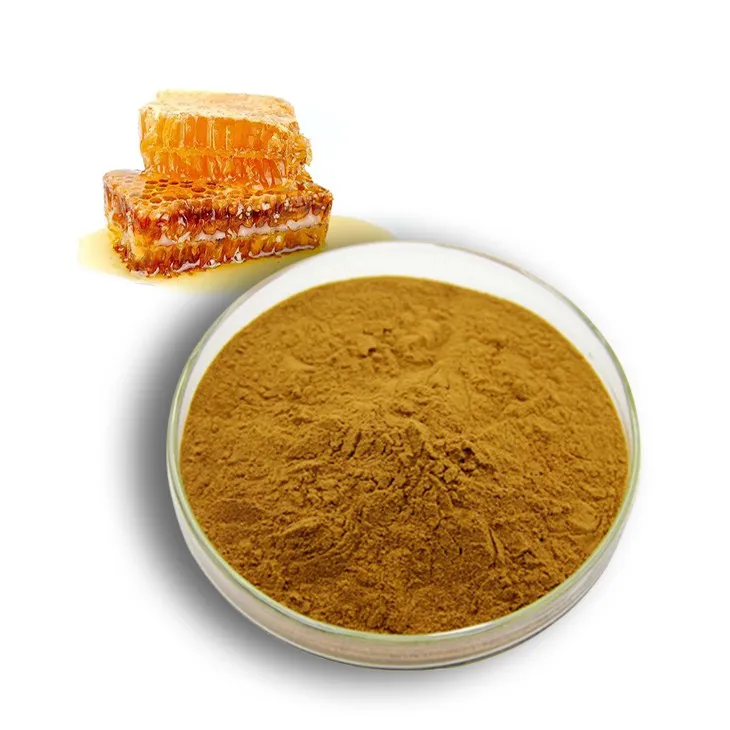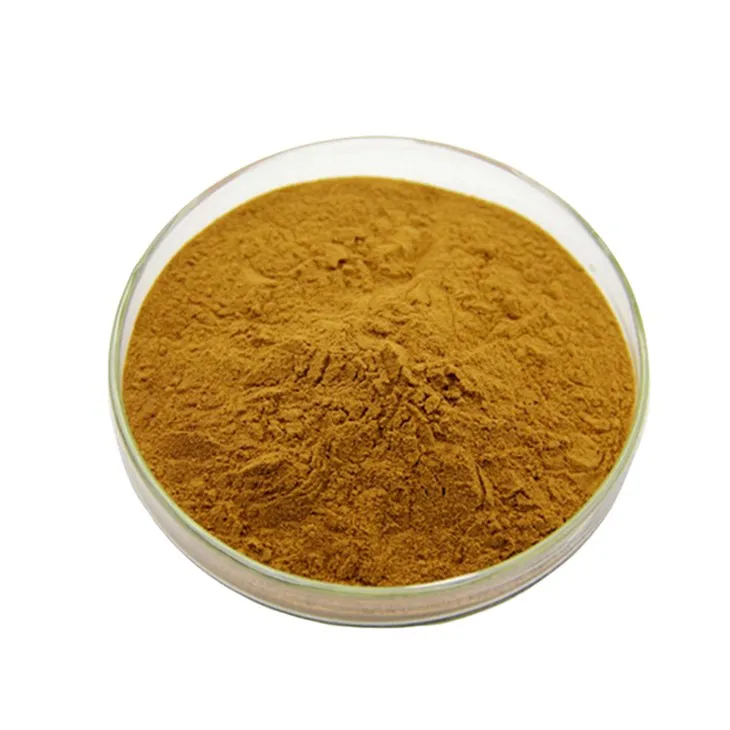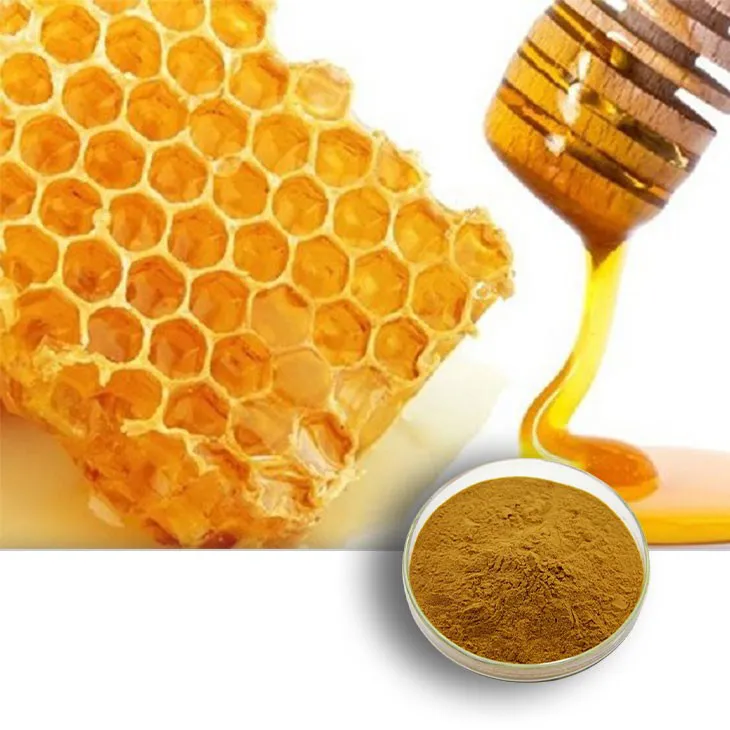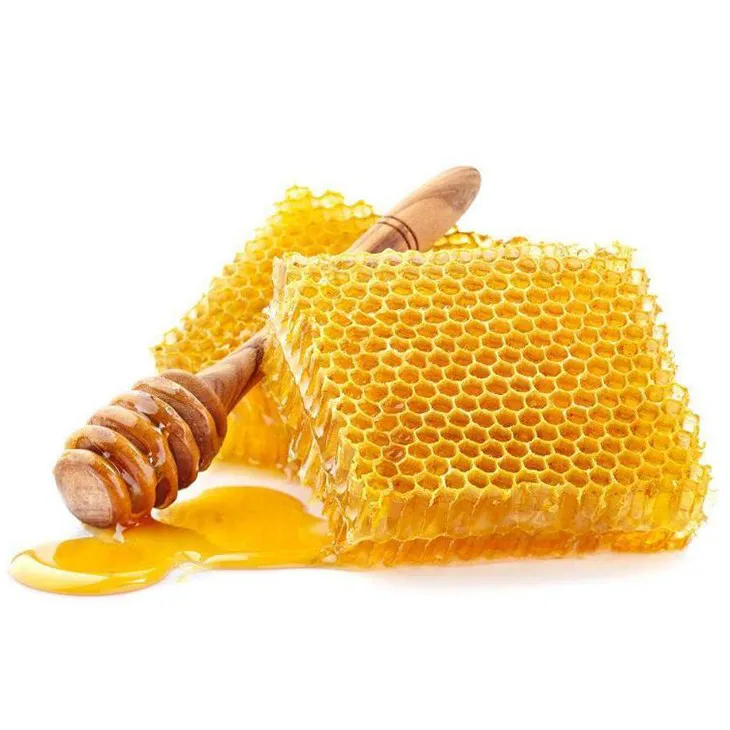- 0086-571-85302990
- sales@greenskybio.com
What is propolis extract powder? Definition, types, history and nutritional value.
2024-12-13

1. Definition of Propolis Extract Powder
Propolis Extract Powder is a remarkable product that is directly sourced from propolis. Propolis itself is a resin - like substance that is painstakingly collected by bees from various natural sources such as tree buds, sap flows, or other botanical origins. Bees use propolis within their hives for multiple crucial purposes, including sealing small gaps and cracks, protecting the hive from external invaders like bacteria, fungi, and pests, and maintaining a hygienic environment for the colony.
The extraction process of Propolis Extract Powder involves several sophisticated steps. First, the raw propolis is carefully harvested from beehives. Then, it is typically purified to remove any impurities such as wax, debris, or other foreign substances. After purification, the propolis is subjected to extraction methods that aim to isolate and concentrate its active components. This results in the formation of a more refined and potent product - the propolis extract powder.

2. Types of Propolis Extract Powder
2.1 Based on Extraction Methods
- Solvent - Extracted Propolis Extract Powder: This is one of the most common types. In this method, solvents such as ethanol or water - ethanol mixtures are used to extract the active components from propolis. The choice of solvent can significantly impact the composition of the final extract powder. Ethanol, for example, is effective in extracting a wide range of flavonoids and phenolic acids. However, the extraction process needs to be carefully controlled to ensure that the solvent is completely removed at the end to avoid any potential toxicity or unwanted residues.
- Supercritical Fluid - Extracted Propolis Extract Powder: This is a more advanced extraction technique. Supercritical fluids, often carbon dioxide, are used under specific temperature and pressure conditions. This method has several advantages. It can produce a more pure extract as it can selectively extract the desired components. Also, since carbon dioxide is a non - toxic and easily removable gas, there is less risk of residue in the final product. This type of extract powder may have a different chemical profile compared to solvent - extracted ones, potentially containing a higher concentration of certain bioactive compounds.
2.2 Based on Source Plants
- Poplar - Based Propolis Extract Powder: Poplar trees are a common source of propolis in many regions. Propolis collected from poplar buds and sap has a characteristic chemical composition. It is often rich in flavonoids such as chrysin and galangin. The extract powder derived from poplar - based propolis may have unique antioxidant and antibacterial properties due to these specific flavonoid components.
- Beech - Based Propolis Extract Powder: Beech trees can also be a source of propolis. The chemical profile of beech - based propolis is different from that of poplar - based propolis. It may contain different phenolic acids and flavonoids, which can lead to variations in its biological activities. For example, it may have different antibacterial spectra or antioxidant capabilities compared to other types of propolis extract powder.
- Coniferous - Based Propolis Extract Powder: Propolis sourced from coniferous trees, such as pine or spruce, has its own distinct features. These types of propolis are often rich in diterpenic acids and other compounds specific to coniferous plants. The extract powder from coniferous - based propolis may exhibit unique anti - inflammatory properties due to the presence of these particular compounds.

3. History of Propolis
The use of propolis dates back centuries and has a long and rich history in traditional medicine across different cultures.
3.1 Ancient Civilizations
In ancient Egypt, propolis was used for embalming purposes. It was recognized for its ability to preserve and protect the body from decay. The Egyptians also used it in some medicinal preparations, although the exact applications are not fully known.
In ancient Greece, the famous philosopher Aristotle made references to propolis in his works. He noted that bees used a "sticky substance" to build their hives and protect them from diseases. Greek physicians, such as Hippocrates, may have also used propolis in some of their remedies, although the historical evidence is somewhat limited.
3.2 Traditional Medicine in Different Regions
In traditional Chinese medicine, propolis has been used for various health conditions. It was often used in combination with other herbs to treat ailments such as skin diseases, ulcers, and infections. Chinese traditional medicine recognized the antibacterial and anti - inflammatory properties of propolis, although the understanding was based on empirical knowledge rather than modern scientific analysis.
In South American traditional medicine, particularly among indigenous tribes, propolis has been used for centuries. It was used to treat wounds, infections, and respiratory diseases. The tribes had their own methods of collecting and using propolis, often relying on the knowledge passed down through generations.
In European traditional medicine, propolis was used in poultices and tinctures. It was used to treat sore throats, colds, and other minor ailments. European herbalists recognized the value of propolis in promoting health and treating certain diseases long before modern scientific research began to explore its properties.

4. Nutritional Value of Propolis Extract Powder
Propolis extract powder is a treasure trove of bioactive compounds, which contribute to its numerous health - promoting properties.
4.1 Flavonoids
Flavonoids are one of the major components in propolis extract powder. These are a diverse group of polyphenolic compounds that have been extensively studied for their health benefits.
- Flavonoids such as Quercetin, kaempferol, and rutin are present in propolis extract powder. Quercetin, for example, is a powerful antioxidant. It can scavenge free radicals in the body, which are unstable molecules that can cause damage to cells and contribute to various diseases such as cancer, heart disease, and neurodegenerative disorders. By neutralizing free radicals, Quercetin helps to protect the body's cells and tissues from oxidative stress.
- Flavonoids also have anti - inflammatory properties. They can modulate the body's immune response and reduce inflammation. Inflammatory conditions such as arthritis, asthma, and inflammatory bowel disease can potentially be alleviated by the anti - inflammatory action of flavonoids in propolis extract powder.
4.2 Phenolic Acids
Phenolic acids are another important class of bioactive compounds in propolis extract powder.
- Compounds like caffeic acid and ferulic acid are present. Caffeic acid has been shown to have antibacterial properties. It can inhibit the growth of various bacteria, including some that are resistant to common antibiotics. This makes propolis extract powder a potential alternative or complementary treatment for bacterial infections.
- Ferulic acid, on the other hand, has antioxidant and anti - inflammatory properties. It can enhance the antioxidant capacity of the body and help to reduce inflammation at the cellular level. This is beneficial for overall health and can play a role in preventing chronic diseases.
4.3 Other Bioactive Compounds
In addition to flavonoids and phenolic acids, propolis extract powder contains other bioactive substances.
- There are diterpenes, which can have anti - inflammatory and analgesic (pain - relieving) properties. These compounds can be particularly useful in treating conditions where pain and inflammation are present, such as in joint pain or muscle soreness.
- Propolis also contains essential oils, which contribute to its characteristic aroma. These essential oils may have their own antibacterial and antifungal properties, further enhancing the overall antimicrobial activity of propolis extract powder.

5. Conclusion
Propolis extract powder is a fascinating and valuable product. Its definition, which is rooted in the unique resin - like substance collected by bees, sets the foundation for understanding its properties. The different types, whether classified by extraction methods or source plants, offer a wide range of chemical compositions and potential applications. Its long history in traditional medicine across the globe is a testament to its perceived value in promoting health. Finally, the rich nutritional value, with its abundance of flavonoids, phenolic acids, and other bioactive compounds, provides a scientific basis for its antioxidant, antibacterial, and anti - inflammatory properties. As research continues, it is likely that more uses and benefits of propolis extract powder will be discovered, further highlighting its importance in the fields of health, nutrition, and medicine.
FAQ:
What are the main extraction methods of propolis extract powder?
There are several common extraction methods. One is the ethanol extraction method, where ethanol is used to dissolve the active components in propolis. Another is supercritical fluid extraction, which can extract the components more efficiently under certain pressure and temperature conditions using supercritical fluids like carbon dioxide. There is also water extraction, although it may not be as effective in extracting all the beneficial components as the other methods.
How do the different types of propolis extract powder vary in their properties?
The types can vary depending on the source plants from which the bees collect the raw material for propolis. For example, propolis from poplar - based sources may have different flavonoid profiles compared to that from other trees. Also, the extraction method affects the properties. Ethanol - extracted propolis extract powder may have a different composition of bioactive compounds compared to water - extracted ones. The different properties can lead to variations in antioxidant, antibacterial, and anti - inflammatory activities.
Can propolis extract powder be used in food?
Yes, in some cases, propolis extract powder can be used in food. However, there are regulations regarding its use. In certain countries, it can be added to functional foods, such as some health - promoting candies or dietary supplements. But strict quality control and safety evaluations are necessary to ensure that it meets food safety standards, as it is a natural product with strong biological activities.
What are the potential side effects of using propolis extract powder?
Some people may experience allergic reactions to propolis extract powder. This can range from mild skin rashes to more severe allergic responses such as difficulty breathing in rare cases. It is also important to note that if taken in excessive amounts, it may cause digestive discomfort, such as nausea or stomach upset, due to its strong bioactive components.
How is propolis extract powder different from regular propolis?
Propolis extract powder is a more refined and concentrated form of propolis. Regular propolis is the raw resin - like substance collected by bees. The extract powder is obtained through extraction processes that isolate and concentrate the bioactive components. This makes the extract powder more convenient for various applications, such as in supplements or in the formulation of pharmaceutical products, as it has a more standardized composition compared to the raw propolis.
Related literature
- Propolis: A Wonder Bee Product and Its Pharmacological Potentials"
- "The Chemical Composition and Biological Properties of Propolis Extracts"
- "Historical and Modern Uses of Propolis in Health and Wellness"
- ▶ Hesperidin
- ▶ citrus bioflavonoids
- ▶ plant extract
- ▶ lycopene
- ▶ Diosmin
- ▶ Grape seed extract
- ▶ Sea buckthorn Juice Powder
- ▶ Beetroot powder
- ▶ Hops Extract
- ▶ Artichoke Extract
- ▶ Reishi mushroom extract
- ▶ Astaxanthin
- ▶ Green Tea Extract
- ▶ Curcumin Extract
- ▶ Horse Chestnut Extract
- ▶ Other Problems
- ▶ Boswellia Serrata Extract
- ▶ Resveratrol Extract
- ▶ Marigold Extract
- ▶ Grape Leaf Extract
- ▶ blog3
- ▶ blog4
- ▶ blog5
-
Pure 85% Tomentil Extract.
2024-12-13
-
Black Pepper Extract
2024-12-13
-
Rosemary extract
2024-12-13
-
Nutmeg Extract
2024-12-13
-
Agaricus Blazei Extract
2024-12-13
-
Phellodendron Extract
2024-12-13
-
Oyster Mushroom Extract Powder
2024-12-13
-
Resveratrol extract
2024-12-13
-
Pine bark Extract Powder
2024-12-13
-
Grape Leaf Extract
2024-12-13
-
Cocoa Extract
2024-12-13





















